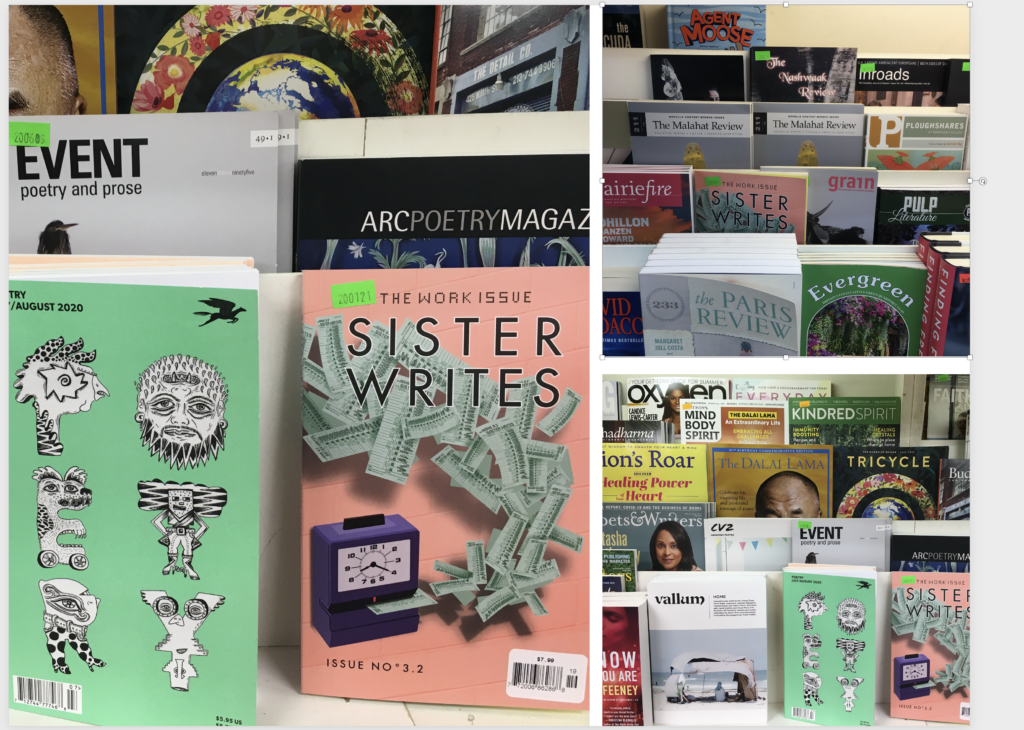Sister Writes: The Work Issue was created to shed light on the hidden experiences and contributions of women working in Toronto’s service industry. From hotel housekeepers to restaurant cooks, bottle collectors to baristas, retail workers to call centre clerks, women in Toronto’s service industry perform vital and challenging work. Despite their contributions, their stories—and the inequalities they face due to the systemic devaluation of women’s labour—often go unspoken.
I set out to change that with The Work Issue, which culminated in multiple creative outputs, including an anthology of stories, a public launch event, and a companion mini documentary. The magazine, which contains twenty original stories written by women in the Sister Writes program, traverse experiences in a broad range of sectors from retail to hospitality sectors, and are exclsuively comprised of “gig work.” While impossible to distill into a list of “themes,” the stories cover issues such as wage inequality, sexual harassment, workplace bullying, and precarity; they also portray unique moments of solidarity between women workers and instances where women find ways to subvert or even speak back to power.
Together, these works amplify the voices of women workers and shed light on the critical issues they face. To my knowledge, the anthology and video, voiced by the women themselves, are the first of their kind in Canada to provide a platform for women’s stories about working in the service industry and performing reproductive labour.
Drawing on methodologies in community arts education and arts for social justice, I designed the project to combine art and activism through storytelling. From 2018 – 2019, the program I founded, Sister Writes, mounted free creative writing workshops at the Bloor-Gladstone Library in downtown Toronto. These workshops provided women with opportunities to learn writing techniques from professional authors, crafted narratives, collaborated with peers and editors, and polished their stories for publication. I edited the resulting anthology, which was launched at a packed community event in downtown Toronto and sold in bookstores across Canada, sharing these stories with a wide audience.

Sister Writes’ The Work Issue on sale at a bookshop in downtown Toronto, 2020.
Why write about women’s work? Given that 82% of Canadian women participate in the paid workforce, the term “women’s work” might seem archaic. Yet inequality rages on. Canadian women earn 77 cents for every dollar men earn. Women are overrepresented in fields traditionally associated with their gender, like health care, retail, food services, and hospitality. And most precarious and minimum wage workers are women. In fact, one third of Canadian women earn less than $15 an hour.
We were inspired by the pathbreaking work of Studs Terkel, whose 1973 oral history classic Working collected stories of American workers and drew attention to inequality under capitalism. We wanted to find out what women had to say about doing service work in a local Toronto context today. How does precarious work shape women’s lives? What makes women workers proud? What makes them feel demoralised? What needs to change? The Work Issue answers these questions with 20 diverse, real-life stories that tackle the gender wage gap, racism, workplace harassment, emotional labour, language barriers and more.
Our hope is that The Work Issue offers readers insight into the intersectional experiences of women working in industries where inequality persists. While each story is unique in subject matter and style, many writers describe feeling inadequate, comprised, and undervalued, but still manage to take pride in surviving challenging work situations and, sometimes, to confront injustice. By writing about these issues, the writers hope to open the door for change.
The Work Issue was generously supported by a Toronto Metropolitan University Faculty of Arts Creative grant and provided an experiential learning opportunity for a number of TMU students. The companion to the anthology is this short documentary voiced by the writers. We hope you enjoy it.
To learn more about The Work Issue, visit our blog, or to buy an issue, please consult our magazines page.
